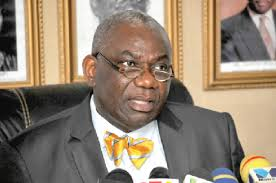Special topics
 Government is anticipating increased activities in Ghana’s oil exploration activities with the coming on board of ExxonMobil.
Government is anticipating increased activities in Ghana’s oil exploration activities with the coming on board of ExxonMobil.
The Minister of Energy, BoakyeAgyarko tells Citi Business News the move will also increase government’s revenue from the sector to propel economic growth and transformation.
ExxonMobil’s investment in the oil sector becomes the first major one in Ghana following the landmark ruling by ITLOS in the maritime border dispute between Ghana and Ivory Coast, in September last year.
The apparent victory by Ghana gives the country an appreciable reputation among the global oil giants.
The Energy Minister, BoakyeAgyarko explains to Citi Business News the move is set to trigger further investments in the short to medium term.
“Exxon Mobil is coming in with the highest standard of safety, financial accounting and all that we need to get done as a country…we have received a lot of expression of interests from other major players; the BP, Shell, Chevron, among others. All of them are now coming to operate in Ghana,” he stated.
On his part, the CEO of the Ghana National Petroleum Corporation (GNPC), Dr. K.K. Sarpong, stressed the enforcement of local content policies.
In his view, the plan will give Ghanaians access to opportunities in Exxon Mobil’s operations where necessary.
“In terms of local content policies, the laws have been strengthened the Petroleum Commission is at the forefront of enforcing the laws and we at GNPC have the sustainability and localization department which tries to make sure that we bring our partner’s attention to the mode of operation so that we take advantage to get benefits from our local people both corporate and individuals.”
ExxonMobil joins other operators in Ghana’s petroleum upstream sector including, Tullow, Kosmos, ENI, among others.
Earlier, some industry analysts raised concern over the Energy Minister’s failure to subject the contract to competitive bidding as spelt out in the Petroleum Exploration and Production law.
Reacting to this however, the Energy Minister maintained that the negotiations started before the passage of the law, it couldn’t have taken retrospective effect.
“There were four issues which put the negotiations into abeyance; they bordered on the treatment of foreign exchange, tax issues, among others. When we came in in 2017, the company approached us again and expressed their interest to revive the negotiations with the country but outlined the need to work around the issues so it could pave the way for their operations,” he stated.
“ExxonMobil started its program of operating in Ghana before the passage of the E&P law was passed in 2016 as such the law could not take a retrospective effect,” Mr. Agyarko added.
The company is expected to start its exploration activities fully after Parliament ratifies the deal.
Ghanaian ownership is estimated at thirty percent.
This comprises 10 percent royalty to the government of Ghana while the GNPC owns 15 percent stake as Carried and Participation Interest.
Also, the local partner for ExxonMobil is entitled to five percent of the company’s stake.